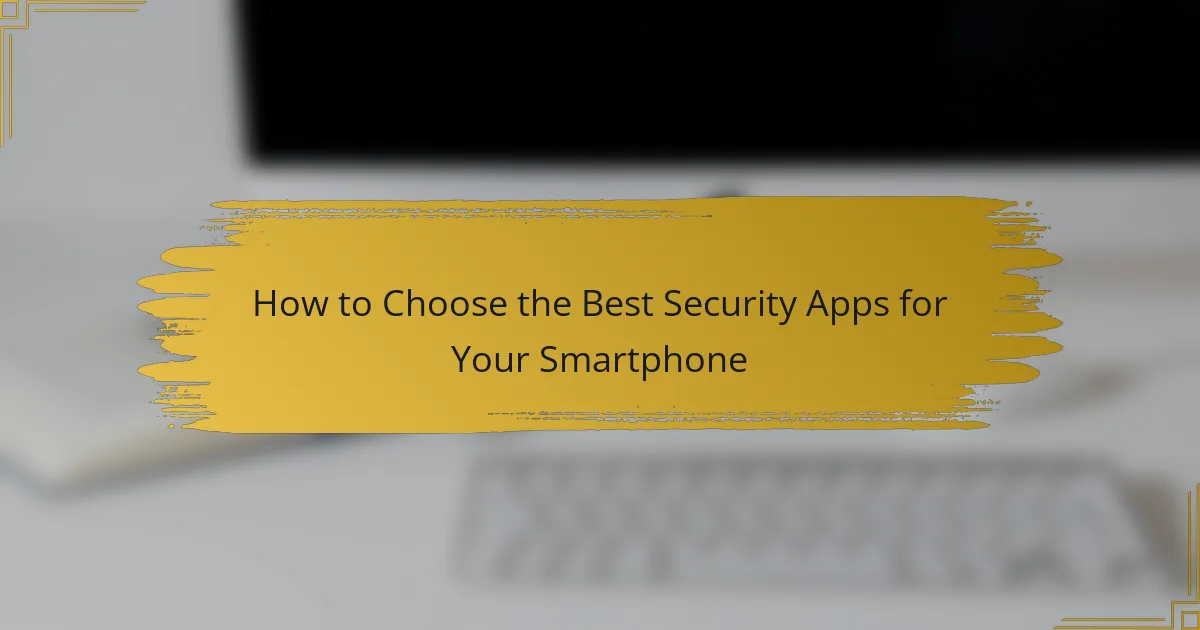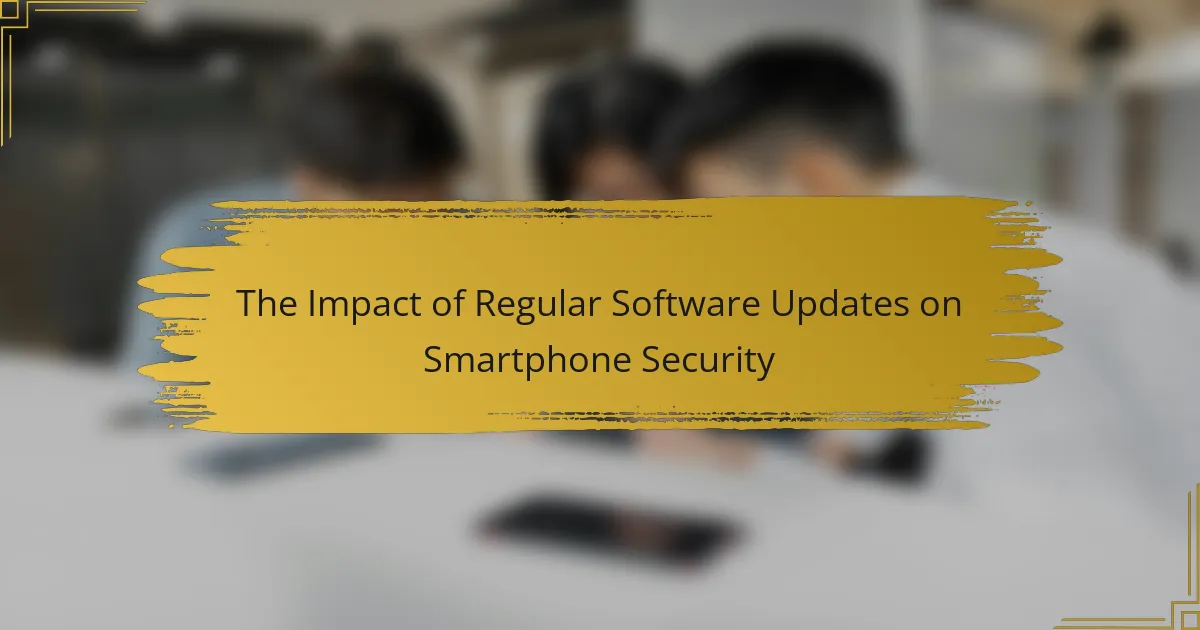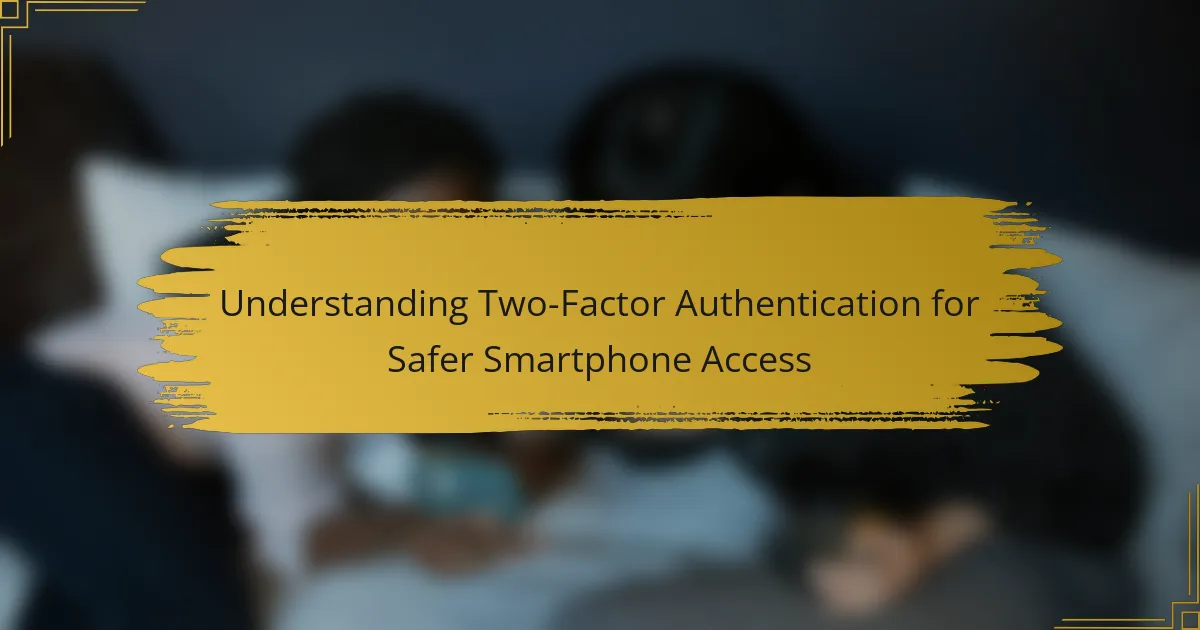A Virtual Private Network (VPN) is a technology designed to create a secure connection over the internet, enhancing smartphone privacy by encrypting internet traffic and masking IP addresses. This article explores how VPNs protect user data from third-party tracking, reduce the risk of data breaches, and allow access to geographically restricted content. Key considerations for selecting a VPN include security features, such as encryption protocols and privacy policies, as well as connection speed, compatibility with devices, customer support, and pricing models. Additionally, potential drawbacks of using VPNs on smartphones, such as reduced internet speed, battery consumption, and compatibility issues, will also be examined.
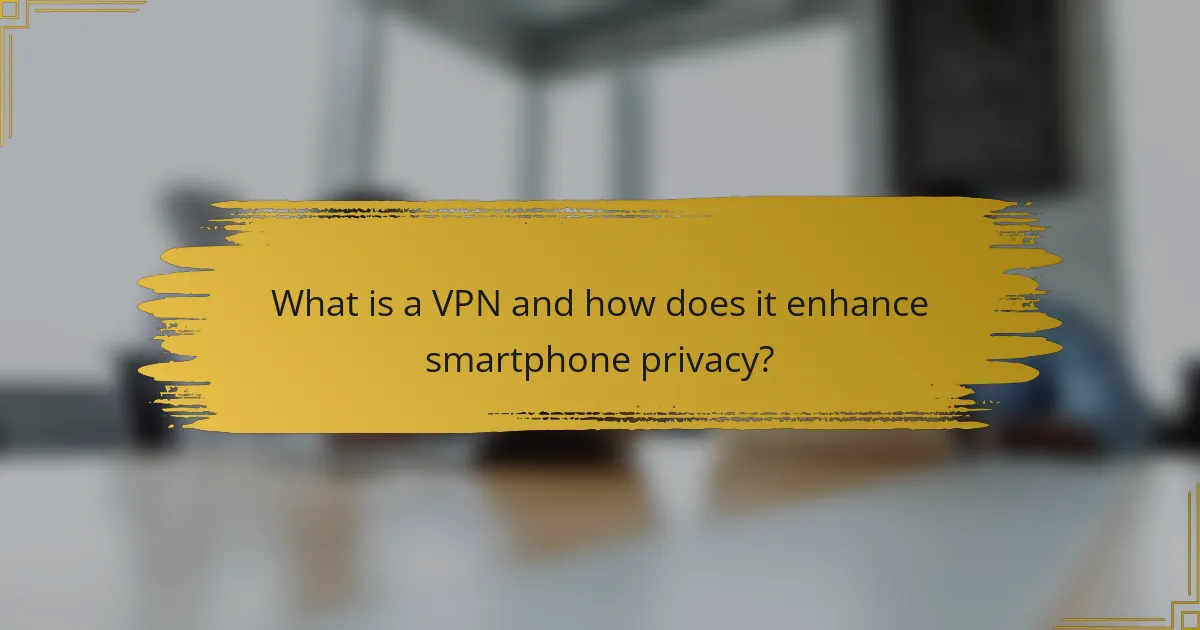
What is a VPN and how does it enhance smartphone privacy?
A VPN, or Virtual Private Network, is a technology that creates a secure connection over the internet. It encrypts your internet traffic and masks your IP address. This process enhances smartphone privacy by preventing third parties from tracking your online activities. With a VPN, your data is routed through a secure server. This makes it difficult for hackers or advertisers to access your personal information. According to a study by the Electronic Frontier Foundation, using a VPN can significantly reduce the risk of data breaches. VPNs also allow users to bypass geographic restrictions, providing access to content without compromising privacy.
How does a VPN function to protect user data on smartphones?
A VPN functions by encrypting user data on smartphones and routing it through a secure server. This encryption transforms the data into a code that is unreadable to unauthorized parties. As a result, sensitive information such as passwords and personal messages remains private. The VPN masks the user’s IP address, making it difficult for third parties to track online activities. Additionally, it protects data from potential threats on public Wi-Fi networks, which are often vulnerable to attacks. By creating a secure tunnel for data transmission, a VPN enhances overall smartphone privacy. Studies indicate that using a VPN significantly reduces the risk of data breaches and identity theft.
What encryption methods do VPNs use to secure data?
VPNs use various encryption methods to secure data. Common methods include OpenVPN, L2TP/IPsec, and IKEv2/IPsec. OpenVPN employs SSL/TLS protocols for secure data transmission. L2TP/IPsec combines Layer 2 Tunneling Protocol with IPsec for added security. IKEv2/IPsec is known for its speed and stability, especially on mobile devices. These methods encrypt data to protect it from eavesdropping and unauthorized access. Encryption levels vary, with AES-256 being a widely used standard for strong security. The effectiveness of these methods is supported by their widespread adoption in the industry.
How do VPNs mask IP addresses for enhanced anonymity?
VPNs mask IP addresses by routing internet traffic through their servers. When a user connects to a VPN, their original IP address is replaced with the VPN server’s IP address. This process conceals the user’s location and identity from websites and online services. The encryption provided by VPNs adds another layer of security. It prevents third parties from intercepting and analyzing the user’s data. According to a study by the Electronic Frontier Foundation, using a VPN significantly reduces the risk of data exposure. This mechanism enhances user anonymity online by making tracking and identification more difficult.
What are the key benefits of using a VPN on smartphones?
Using a VPN on smartphones enhances privacy and security. It encrypts internet traffic, protecting user data from hackers and surveillance. A VPN masks the user’s IP address, making online activities anonymous. This helps bypass geo-restrictions, allowing access to content unavailable in certain regions. According to a study by the Pew Research Center, 25% of smartphone users have experienced a data breach. Using a VPN significantly reduces this risk. Additionally, VPNs provide secure connections on public Wi-Fi networks, which are often vulnerable to attacks. This layered security is crucial for safeguarding sensitive information.
How does a VPN protect against data breaches and cyber threats?
A VPN protects against data breaches and cyber threats by encrypting internet traffic. This encryption makes it difficult for hackers to intercept and access sensitive information. VPNs also mask the user’s IP address, enhancing anonymity online. This prevents attackers from tracking online activities or pinpointing the user’s location. Additionally, VPNs can secure connections on public Wi-Fi networks, which are often vulnerable to cyber threats. By using a VPN, users can reduce the risk of data theft and unauthorized access. Studies show that VPNs significantly lower the chances of cyber attacks on devices connected to unsecured networks.
In what ways does a VPN improve online privacy for smartphone users?
A VPN improves online privacy for smartphone users by encrypting their internet traffic. This encryption makes it difficult for third parties to intercept data. It masks the user’s IP address, enhancing anonymity online. By routing traffic through secure servers, VPNs prevent tracking by websites and advertisers. Additionally, VPNs protect users on public Wi-Fi networks, which are often unsecured. This protection reduces the risk of data theft and unauthorized access. Studies show that using a VPN can significantly lower the chances of being targeted by cyberattacks. Overall, VPNs provide a robust layer of security for smartphone users.
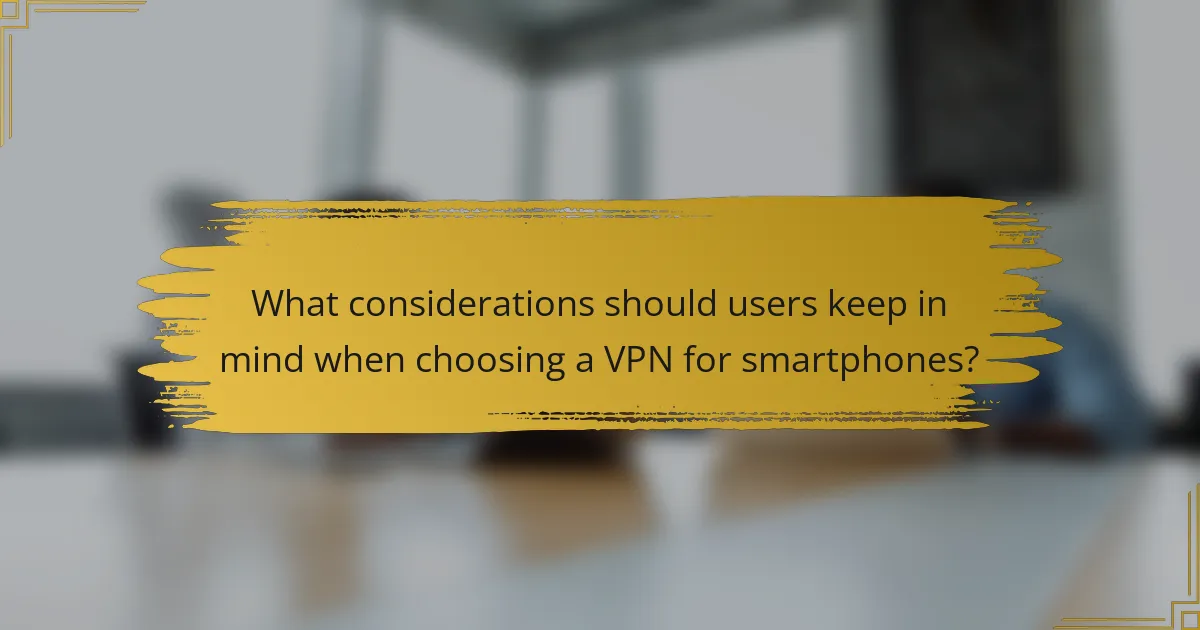
What considerations should users keep in mind when choosing a VPN for smartphones?
Users should consider security features when choosing a VPN for smartphones. Encryption protocols, such as OpenVPN and IKEv2, are essential for protecting data. Users should also check the VPN’s privacy policy. A no-logs policy ensures that user activity is not stored. Connection speed is another critical factor. Slower VPNs can hinder browsing and streaming experiences. Compatibility with multiple devices enhances usability. Users should ensure the VPN supports their smartphone’s operating system. Customer support is vital for resolving issues quickly. A responsive support team can significantly improve user experience. Finally, users should evaluate pricing and subscription models. Affordable plans with flexible options are often more appealing.
What features should users look for in a smartphone VPN?
Users should look for security features, speed, and ease of use in a smartphone VPN. Strong encryption protocols like OpenVPN and IKEv2 are essential for protecting data. A no-logs policy ensures that user activity is not tracked or stored. Additionally, users should consider a kill switch that stops internet traffic if the VPN connection drops. Multi-device support allows users to secure multiple devices with one subscription. Fast connection speeds enhance the browsing experience without noticeable lag. User-friendly interfaces make it easier to navigate the app and connect to servers. Lastly, customer support availability can assist users with technical issues.
How important is the VPN’s logging policy for user privacy?
The VPN’s logging policy is crucial for user privacy. A strict no-logs policy ensures that the VPN provider does not store any user activity data. This means that even if requested by authorities, there is no information to hand over. In contrast, VPNs that log user data can compromise privacy. They may track browsing history, IP addresses, or connection times. This data can be vulnerable to breaches or misuse. Research indicates that users prioritize privacy when choosing VPN services. A study by the Electronic Frontier Foundation found that 79% of users consider logging policies important. Thus, a transparent logging policy directly impacts user trust and privacy protection.
What role do server locations play in the effectiveness of a smartphone VPN?
Server locations are crucial for the effectiveness of a smartphone VPN. They determine the speed, latency, and accessibility of the VPN connection. A closer server location usually results in faster connection speeds. This is because data has a shorter distance to travel. Additionally, server locations affect the ability to bypass geo-restrictions. Accessing content may be restricted based on the user’s physical location. Therefore, selecting a server in a different country can allow users to view region-locked content. Moreover, diverse server locations enhance privacy by masking the user’s actual IP address. This makes it harder for websites and services to track user activity. In summary, server locations directly impact VPN performance and user experience.
How can users ensure they are selecting a trustworthy VPN service?
Users can ensure they are selecting a trustworthy VPN service by evaluating several key factors. First, look for a no-logs policy, which means the service does not track user activity. This is critical for privacy protection. Second, check for independent security audits. These audits validate the service’s claims about security and privacy measures. Third, assess the encryption standards used by the VPN. Strong encryption, such as AES-256, is essential for safeguarding data. Fourth, read user reviews and expert opinions. These can provide insights into the service’s reliability and performance. Additionally, verify the jurisdiction where the VPN operates. Some countries have stronger privacy laws than others. Finally, ensure the VPN offers a money-back guarantee. This allows users to test the service risk-free. Collectively, these factors help users identify a trustworthy VPN service.
What are the signs of a reputable VPN provider?
A reputable VPN provider exhibits several key signs. These include a clear privacy policy that outlines data handling practices. They should have a no-logs policy, ensuring user activity is not recorded. Strong encryption protocols, such as AES-256, are essential for secure data transmission. A wide range of server locations enhances user access to content. Additionally, positive user reviews and independent audits validate their reliability. Customer support availability through various channels is also important for user assistance. Lastly, transparency in ownership and operations builds trust with users.
How can user reviews influence the choice of a VPN?
User reviews significantly influence the choice of a VPN. They provide firsthand experiences from actual users. These reviews can highlight strengths such as speed, reliability, and customer support. Conversely, they may expose weaknesses like connection drops or poor privacy practices. A study by VPNMentor found that 68% of users rely on reviews to select a VPN. Positive reviews can build trust and encourage new users to subscribe. Negative reviews can deter potential customers and prompt VPN providers to improve their services. Overall, user reviews serve as a critical resource for informed decision-making in selecting a VPN.
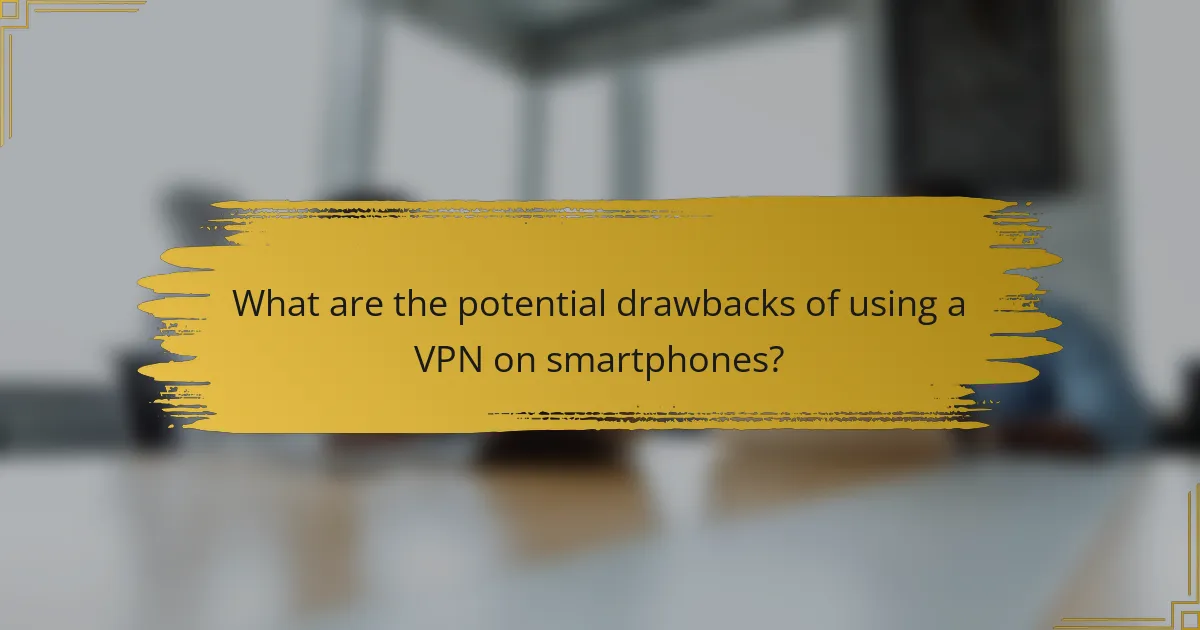
What are the potential drawbacks of using a VPN on smartphones?
Using a VPN on smartphones can have several potential drawbacks. One significant issue is reduced internet speed. VPNs encrypt data, which can slow down connection speeds. Users may experience buffering during streaming or delays in loading websites. Another drawback is battery consumption. VPNs require processing power, leading to faster battery drain. Additionally, some VPNs may log user data, posing privacy risks. Users may unknowingly share sensitive information if the VPN provider is untrustworthy. Compatibility issues can arise with certain apps or services, leading to functionality problems. Finally, some websites may block VPN traffic, limiting access to content.
What limitations might users face when using a VPN on their devices?
Users might face several limitations when using a VPN on their devices. One major limitation is slower internet speeds. VPNs encrypt data, which can lead to reduced bandwidth. Another limitation is potential connectivity issues. Users may experience dropped connections or difficulty in maintaining a stable connection. Some websites and services may block VPN traffic. This can prevent access to certain content. Additionally, VPNs may not offer complete anonymity. Users can still be tracked through other means, such as cookies. There are also compatibility issues with some devices and operating systems. Not all VPN services support every device type. Finally, users may face legal restrictions in certain countries. Some regions have laws against VPN usage, which can lead to penalties.
How can VPNs affect internet speed and performance on smartphones?
VPNs can reduce internet speed and performance on smartphones. This occurs due to the encryption process, which adds extra data to transmissions. The distance to the VPN server also impacts speed; longer distances can result in slower connections. Additionally, server load can affect performance; congested servers may lead to delays. A study by the University of Massachusetts found that VPNs can decrease speeds by 20-30% on average. However, some high-quality VPNs optimize their services to minimize speed loss.
What are the legal implications of using a VPN in different regions?
The legal implications of using a VPN vary significantly by region. In some countries, VPN use is legal and widely accepted. For instance, the United States and Canada allow VPN usage for privacy and security. However, other nations impose strict regulations. China, for example, heavily restricts VPN usage and requires government-approved services. Violating these laws can result in fines or imprisonment. Additionally, some countries, like Russia, mandate VPN providers to register with the government. This regulation aims to control internet access and monitor user activity. Thus, understanding local laws is crucial before using a VPN.
What tips can users follow to maximize their smartphone privacy with a VPN?
To maximize smartphone privacy with a VPN, users should follow several key tips. First, choose a reputable VPN provider that does not log user data. This ensures that your online activities remain private. Second, enable the VPN’s kill switch feature. This feature disconnects the internet if the VPN connection drops, preventing data leaks. Third, use strong encryption protocols like OpenVPN or WireGuard. These protocols secure your internet traffic from potential eavesdroppers. Fourth, regularly update the VPN app to benefit from security patches and improvements. Fifth, connect to the nearest server to enhance speed and reduce latency while maintaining security. Lastly, avoid public Wi-Fi networks without a VPN, as they are often unsecured and susceptible to attacks. Following these tips can significantly enhance smartphone privacy when using a VPN.
How can users configure their VPN settings for optimal privacy?
Users can configure their VPN settings for optimal privacy by selecting a strong encryption protocol. OpenVPN and WireGuard are recommended for their robust security features. Users should also enable a kill switch to prevent data leaks if the VPN connection drops. Additionally, they should choose a VPN provider with a strict no-logs policy to ensure that their browsing activity is not recorded. Regularly updating the VPN software is essential to protect against vulnerabilities. Users should also consider using multi-hop connections for added security. Finally, disabling IPv6 can help prevent potential IP leaks. These configurations enhance privacy by minimizing the risk of data exposure and maintaining anonymity online.
What best practices should users adopt when using a VPN on smartphones?
Users should adopt several best practices when using a VPN on smartphones. First, choose a reputable VPN provider with strong encryption standards. This ensures that data is securely transmitted. Second, enable the kill switch feature if available. This feature disconnects the internet if the VPN connection drops, preventing data leaks. Third, regularly update the VPN app to benefit from security patches and improvements. Fourth, avoid using free VPN services, as they may compromise privacy or sell user data. Fifth, connect to servers in countries with strong privacy laws. This can enhance legal protection for user data. Lastly, be aware of the privacy policy of the VPN provider. Understanding how data is handled is crucial for maintaining privacy.
The main entity of this article is Virtual Private Networks (VPNs), which play a crucial role in enhancing smartphone privacy. The article provides an overview of how VPNs function to protect user data through encryption and IP address masking, thereby preventing unauthorized access and online tracking. Key benefits of using VPNs on smartphones include increased security on public Wi-Fi, the ability to bypass geo-restrictions, and reduced risk of data breaches. Additionally, the article discusses important considerations for selecting a trustworthy VPN service, including logging policies, encryption standards, and server locations, while also addressing potential drawbacks and best practices for maximizing privacy.
